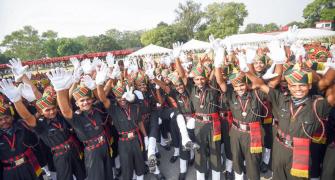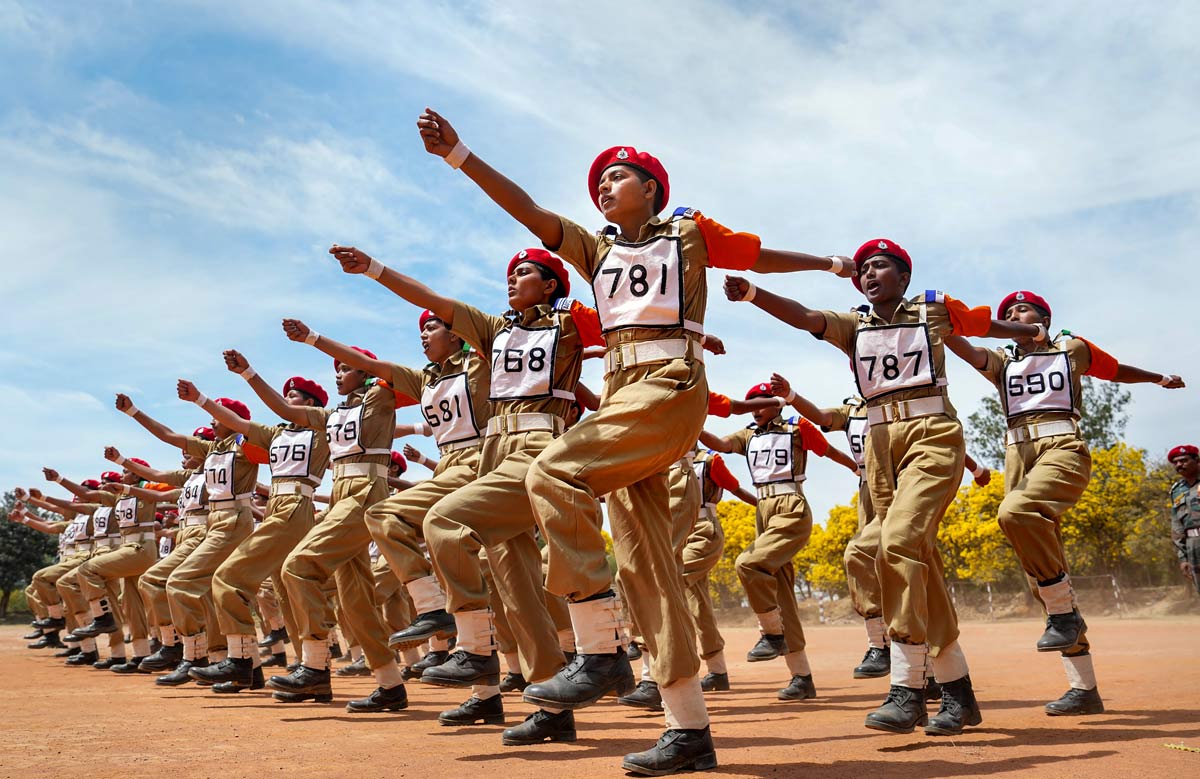Rajasthan and Arunachal Pradesh have joined other Bharatiya Janata Party-ruled states that have announced reservation or preference to ex-Agniveers for jobs in uniformed services like police, amid criticism of the short service military recruitment scheme by opposition parties which are calling for its scrapping.

States like Uttar Pradesh, Uttarakhand, Gujarat, Odisha, Madhya Pradesh and Chhattisgarh had on Friday announced similar incentives.
Rajasthan Chief Minister Bhajanlal Sharma said his government will provide reservation for Agniveers in the recruitment of jail and forest guards and the state police.
A statement from the Chief Minister's Office on Saturday said Sharma made the announcement for Agniveers on the occasion of Kargil Vijay Diwas on July 26.
"The Rajasthan government has made a provision of reservation in state police, jail guard and forest guard recruitments for the Agniveers who protect the country's borders with a sense of dedication and patriotism," it said.
However, the percentage of the reservation in these services for Angiveers was not disclosed.
Retired Agniveers will be given preference during recruitment for the state's police, emergency and fire services, Arunachal Pradesh Chief Minister Pema Khandu announced.
Khandu said this transformative initiative would enable the youngsters of Arunachal Pradesh to serve the country.
"The government of Arunachal Pradesh will facilitate training for local youths to prepare them for recruitment as Agniveers under the AGNIPATH scheme," the chief minister said in a post on X.
"Additionally, retired Agniveers from Arunachal Pradesh will be given preference in recruitment for the Arunachal Pradesh Police, AP Battalions, and Emergency and Fire Services," he added.
On Friday, the Odisha government announced a 10 per cent quota and five years of age relaxation for Agniveers in the state's uniformed services.
Uttar Pradesh Chief Minister Yogi Adityanath said that the Agniveers who return after serving the country will be given weightage in UP Police and Provincial Armed Constabulary.
However, Samajwadi Party president Akhilesh Yadav said on Saturday that the Agnipath scheme will be cancelled "as soon as we come to power".
While campaigning for the Lok Sabha elections, Yadav repeatedly promised to scrap the scheme if the INDIA bloc, of which the Samajwadi Party is a constituent, formed the government at the centre.
In a post on X, Yadav said, "As soon as we come to power, the short-term 'Agniveer' military recruitment that compromises the security of the country and plays with the future of the soldiers will be cancelled within 24 hours."
"This is our demand on 'Agniveer' … The old recruitment (model) should be reinstated," he said in Hindi.
On Friday, Chhattisgarh Chief Minister Vishnu Deo said Agniveers from the state would be given priority while recruiting police constables and forest and jail guards once they complete their service in the Indian Army.
Gujarat Chief Minister Bhupendra Patel said his government will give priority to Agniveers in the recruitment for armed police as well as the State Reserve Police Force.
Madhya Pradesh Chief Minister Mohan Yadav said his government will provide quota to Agniveers in police and armed forces recruitment.
Agniveers will be granted a reservation in government jobs in Uttarakhand upon their return after serving in the armed forces, Chief Minister Pushkar Singh Dhami announced on Friday.
Last week, Haryana's BJP government had also announced a 10 percent reservation for Agniveers in the recruitment of constables, forest guards and jail wardens, along with quotas in other posts, months ahead of the assembly polls.
Chief Minister Nayab Singh Saini also said that in the recruitment for civil posts in Group B and Group C, the government has decided to grant Agniveers a relaxation of three years in the upper age limit. "However, for the first batch of Agniveers, this age relaxation will be five years," he added.
He said his government will provide Agniveers five per cent reservation in direct recruitments for civil posts in Group C and one per cent in Group B.
Saini also announced that if an Agniveer takes a loan of up to Rs 5 lakh to start a business, no interest will be charged on it.
The Centre introduced the Agnipath scheme in 2022 for short-term induction of personnel in the Army, Navy and Air Force, with an aim to bring down the age profile of the three services.
The scheme provides for recruiting Agniveers youngsters between the age group of 17-and-a-half and 21 for a block period of four years with a provision to retain 25 percent of them for another 15 years.
The Union ministry of home affairs had announced that 10 percent of vacancies for recruitment in the Central Armed Police Forces or the paramilitary forces would be reserved for ex-Agniveers.
PM Modi on Friday said the Agnipath scheme is an example of necessary reforms undertaken by the Army and accused the opposition of playing politics over the recruitment process.
"The aim of Agnipath is to make the forces young...The aim of Agnipath is to keep the armies continuously fit for war," he said and rubbished claims the Agnipath scheme was launched to save pension money.
The Congress and other parties have alleged that the Agnipath scheme is discriminatory to soldiers, has disrupted the recruitment process for armed forces and can compromise the country's security.









